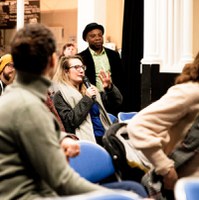What is a Citizens' Assembly?

Community Painting Day. Photo credit: Khali Ackford
In partnership with St Paul’s Carnival and David Jubb of Citizens In Power, Trinity are exploring how we can co-create a cultural strategy for the city and surrounding region.
During this research phase funded by Calouste Gulbenkian Foundation (UK Branch), we invited a range of collaborators from the sector who place participation at the heart of their practice to hear from some of the best speakers working in democratic decision making right now.
These focus groups have been a chance to share ideas, experiences, knowledge and expertise on co-creation, participatory democracy and how we can do things differently in the culture sector.
In a series of blogs we are documenting and sharing what we are uncovering this journey.
Part 1: What is a Citizens' Assembly?
For the first focus group we welcomed Brett Hennig, co-founder of the Sortition Foundation. The Sortition Foundation is an organisation that believes in representative and participatory politics, with a particular focus on Citizens' Assemblies.
The purpose of these assemblies, Brett outlined, is that they bring people together from all walks of life and give the time and space for people to collectively tackle issues. It is a model, Brett shared, that Bristol itself has delivered as part of its plan for post-Covid recovery.
Citizens' Assemblies work by a three-part process of learning, discussion, and decision-making. In the learning stage, evidence is presented on the topic by ‘expert witnesses’, the group then discuss this evidence and work together to come to a consensus to create recommendations. These recommendations are then put to the vote. The recommendations that are most supported can become the official recommendations of the assembly.
Brett stressed the importance of having representation in a Citizens' Assembly, so the pool must be reflective of demographic data and, in the case of our project, cultural engagement. He shared that, unlike politics, Young People (30 and under) are represented in Citizens' Assemblies because of the nature of the selection process that reflects a city’s demographic data.
Participants of Citizens' Assemblies are selected via an independent third party - these organisations will initially contact citizens directly using a database, such as the Royal Mail’s database of every postal address in the UK. There is then a second selection of the people who respond to the invitation based on the demographic data they provide.
The group were interested in how the experts are selected - as this could be contentious. Using an example of congestion in a city, Brett explained that a Local Authority could commission an external third party to collect the evidence at hand, perhaps from an open call out. An Oversight Group for the assembly will be given the responsibility for ensuring the evidence that is presented to the assembly is balanced. Assembly members can also be part of the process of identifying contributors to the assembly. This would enable a wider pool of opinions, practically from those invested in the topic with expertise and/or lived experience.
The group wanted to understand how large a Citizens' Assembly should be. Brett shared that, in deliberative democracy, it is not a big numbers game. The key is representation. Brett shared that in Ireland, assemblies have seen numbers of up to 100 people, France had 150 in the Climate Assembly, but many local assemblies are around 40 people.
In summarising his talk, the discussion centred around how to ensure that voices are heard and amplified in Citizens' Assemblies, specifically those from Communities who may face barriers to participation. Brett shared that perhaps over-representation could be a consideration so that more communities are attending for specific areas whose voices are historically not amplified. Brett also explained that representation is not only about the citizens in the assembly but also about the voices of those who give evidence.
Interested in finding out more?
We will continue to share our findings from the research stage our project alongside programming further focus groups and action-learning sessions.
- Keep up-to-date about the project by joining our mailing list
- Read Freddie Wulf's article: Identity Capital
- Watch Trinity's take over of the Radix Big Tent
- Join in the conversation using #67MillionVoices


